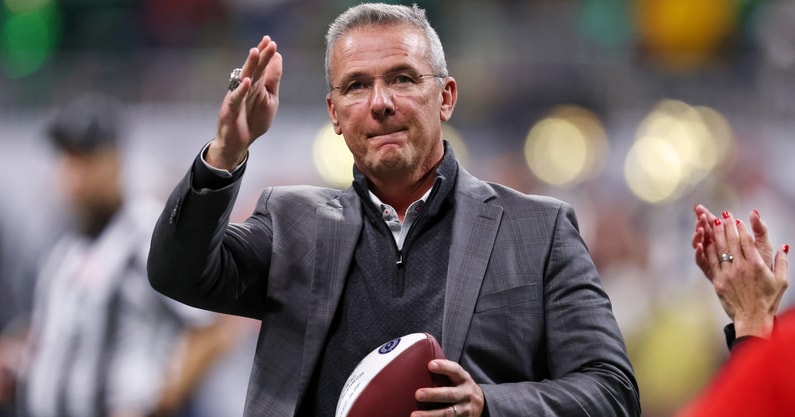Urban Meyer: 'The days of Florida State are numbered' with proposed rev-share contract terms: 'It can't happen'

The Florida State Seminoles have found themselves in some controversy regarding their revenue-sharing contracts with student-athletes. That stems from some of the language and clauses that are included, and has analysts concerned about what it could mean for Florida State in the future.
One of those concerned with these contracts is Urban Meyer. He explained on The Triple Option that if those proposed rev-share contract terms don’t change, Florida State is going to be in major trouble moving forward.
“I’ll make this statement,” Urban Meyer said. “If this is legit, if this goes through, which I’m so skeptical, then the days of Florida State are numbered. It won’t happen. It can’t happen. No chance.”
The major challenge that Florida State could face from what are seen as restrictive rev-share contract terms is recruiting. If players aren’t getting beneficial terms, they could choose to go somewhere else, which co-host of The Triple Option, Mark Ingram emphasized.
“Players aren’t going to go there because, for one, this contract gives Florida State way too much control over your future and your money. It exposes you to risk, injury, discipline, loss of leverage,” Mark Ingram said. “All that. So, if you’re a top player and you’ve got Florida State as your top university and they give you this, I’m sure there’s another university that is going to give you better conditions and treat you like a partner, not an asset.”
In drafts of the Florida State contracts, initially viewed by CBS Sports, the school could unilaterally extend a player at the end of a contract without going through negotiations with them. The school could, furthermore, issue fines in the thousands of dollars for losing equipment, like cleats. On top of that, there’s a clause regarding breach of contract that includes “illness or injury which is serious enough to affect the value of rights granted to the school.” In that case, Florida State could renegotiate or cancel a player’s deal.
Urban Meyer, as a former head coach, had some major concerns there. He’d echo Mark Ingram, explaining that there is a desire to regain control. However, this goes too far and is going to hurt recruiting and, ultimately, athletics.
Top 10
- 1Breaking
Alabama stays hot
Tide lands another 5-star
- 2New
Big Ten Football
Preseason conference ranking
- 3Hot
Paul Finebaum
Ominous Ohio State prediction
- 4
CFB Top 25
Predicting final 2025 rankings
- 5
MLB Mock Draft
Massive Top 5 shakeup
Get the On3 Top 10 to your inbox every morning
By clicking "Subscribe to Newsletter", I agree to On3's Privacy Notice, Terms, and use of my personal information described therein.
“I think what’s happening is the pendulum swung so far that the players could leave anytime, unlimited transfers, NIL, no limitations, no guardrails, and now it’s swinging back,” Meyer said. “And some people that shouldn’t be involved are getting too involved and they’re putting this power struggle that I’ve never seen anything like that. Again, if this — recruiting, it’s over. You can’t recruit, and in case you haven’t noticed, college football is about recruiting.”
Florida State defends controversial rev-share contract language that concerned agents, rival GMs
While Florida State has heard the pushback to the language in these contracts, for now the school seems to stand by them. In a statement, they’d defend the language and clauses.
“As we enter into a new age of collegiate athletics, Florida State has put together an agreement that provides deliverables and expectations for all parties,” Florida State’s statement read. “Each individual situation will be unique and the hypotheticals are impossible to predict. However, we are committed to continuing to provide an elite experience for our student-athletes in all aspects of their collegiate career. Florida State is looking forward to the mutually beneficial partnerships with our student-athletes in this new era.”
The House settlement allows for revenue sharing between schools and athletes of up to $20.5 million annually. It’s unclear how Florida State intends on distributing that between their sports. However, football is expected to get the majority of the revenue.